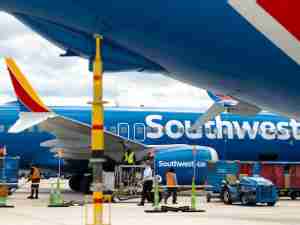Wizz Air Holdings Plc expects the aircraft-engine issues that have led to widespread jet groundings to start improving, saying it’s at a peak of the disruptions that have weighed on the low-cost carrier’s operations for the past year.
The airline had 47 Airbus SE A320 family aircraft on the ground because of engine issues as of May 17, it said in a company filing. Wizz said it expects about 50 aircraft grounded by the end of the first half of fiscal 2025.
“We are peaking as we speak,” Chief Executive Officer Jozsef Varadi said in an interview. “We are starting to see the engine issues as more of an upside because the situation is bad enough.”
Wizz rose as much as 6% in London trading, narrowing the decline this year to about 5.9%.
The carrier will receive aircraft without the engine issues starting next month while Pratt & Whitney has cut down engine shop visit times from 300 days to about 180 days, the CEO said. Varadi expects to have 35 jets grounded next summer and said he’s confident he can put the issue to rest entirely in the next few of years.
Capacity won’t advance in the fiscal first half and the full year as the Hungarian budget airline continues to grapple with geopolitical instability and the groundings, Wizz said in the filing. The company said it has secured compensation from Pratt and expects more payments “on similar terms” for the final quarter of the fiscal year “and beyond.”
Trading in the financial year “has been encouraging, with sustained demand and positive booking momentum for the summer,” Wizz said. The company predicted net income for the full year of €500 million ($541 million) to €600 million, compared with a Bloomberg estimate of €515 million. Net income attributable to shareholders last year reached €376 million, beating estimates.
Besides the engine issues, Wizz has grappled with air traffic control disruptions as well as geopolitical tensions that include disruptions on its service to Israel. The company said the revenue impact from the Israel-Hamas conflict and the wider region came to about €80 million in its most recent fiscal year.
Wizz is the last of the major low-cost carriers to post results this quarter. Ryanair Holdings Plc and EasyJet Plc both reported strong travel demand this summer and pointed to constrained capacity across Europe as airlines face supply chain backlogs.








